初英考点精讲 183 节日与假日【知识点微课课件】
文档属性
| 名称 | 初英考点精讲 183 节日与假日【知识点微课课件】 |

|
|
| 格式 | pptx | ||
| 文件大小 | 9.3MB | ||
| 资源类型 | 试卷 | ||
| 版本资源 | 通用版 | ||
| 科目 | 英语 | ||
| 更新时间 | 2021-07-15 00:00:00 | ||
图片预览

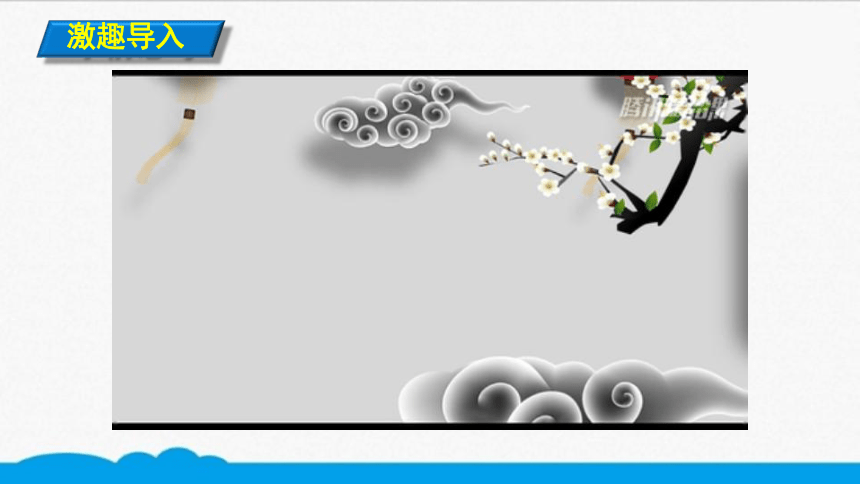
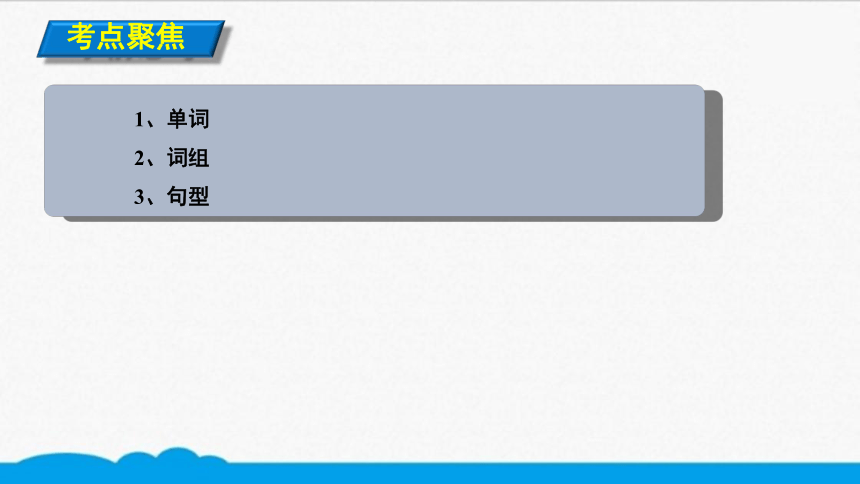
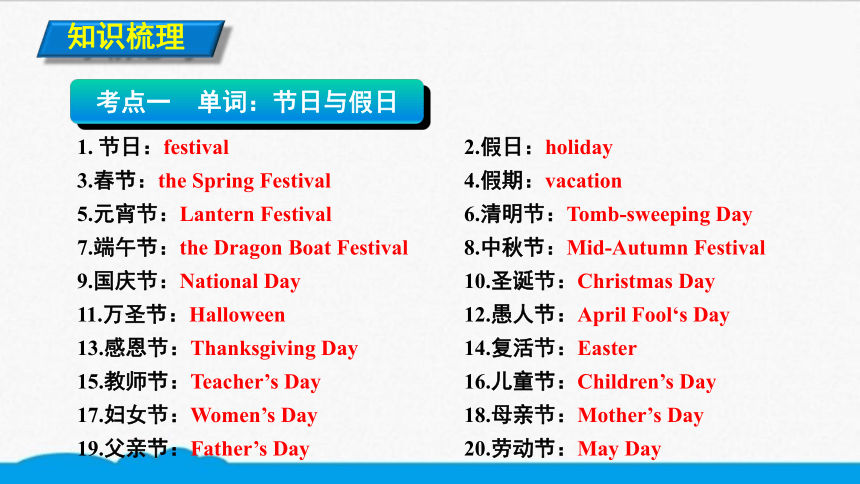
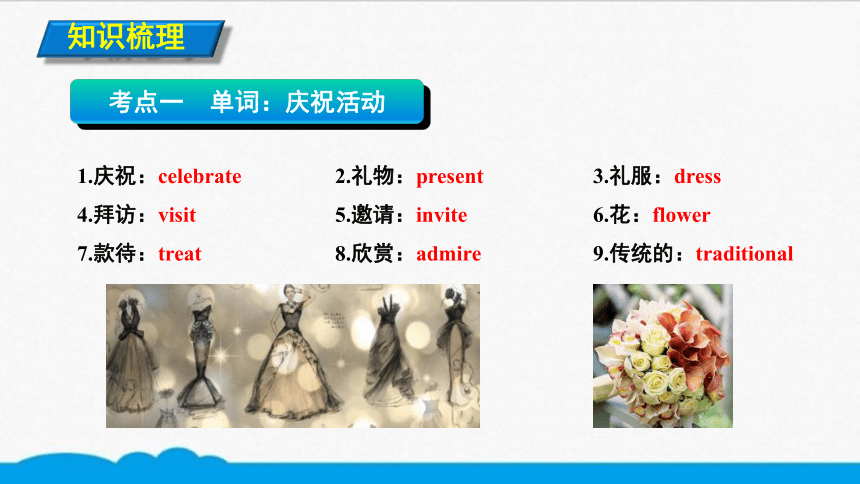

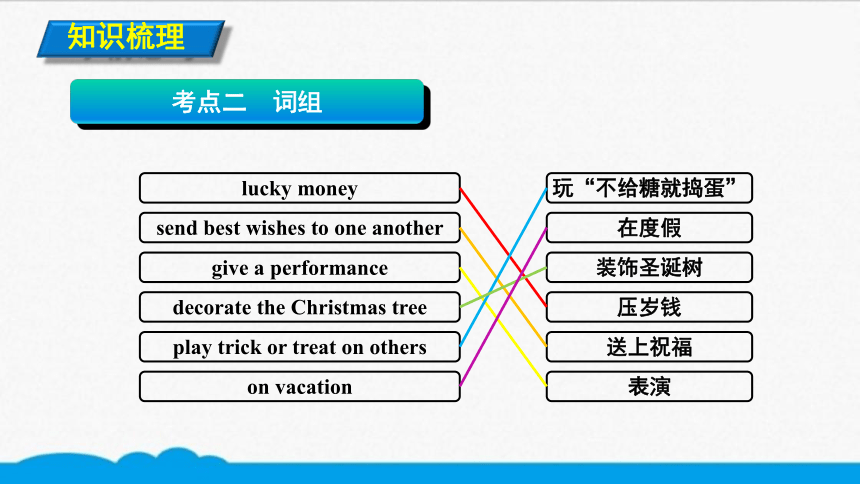
文档简介
节日与假日
激趣导入
考点聚焦
1、单词
2、词组
3、句型
考点一 单词:节日与假日
知识梳理
1. 节日:festival 2.假日:holiday
3.春节:the Spring Festival 4.假期:vacation
5.元宵节:Lantern Festival 6.清明节:Tomb-sweeping Day
7.端午节:the Dragon Boat Festival 8.中秋节:Mid-Autumn Festival
9.国庆节:National Day 10.圣诞节:Christmas Day
11.万圣节:Halloween 12.愚人节:April Fool‘s Day
13.感恩节:Thanksgiving Day 14.复活节:Easter
15.教师节:Teacher’s Day 16.儿童节:Children’s Day
17.妇女节:Women’s Day 18.母亲节:Mother’s Day
19.父亲节:Father’s Day 20.劳动节:May Day
考点一 单词:庆祝活动
知识梳理
1.庆祝:celebrate 2.礼物:present 3.礼服:dress
4.拜访:visit 5.邀请:invite 6.花:flower
7.款待:treat 8.欣赏:admire 9.传统的:traditional
考点二 词组
知识梳理
traditional festival
have a big meal/ dinner
dress up
buy sth.for sb. /buy sb.sth.
have a good time/enjoy oneself
visit one’s relatives and friends
买某物给某人
看望亲朋好友
传统节日
玩的很愉快
乔装打扮
吃大餐
考点二 词组
知识梳理
lucky money
send best wishes to one another
give a performance
decorate the Christmas tree
play trick or treat on others
on vacation
玩“不给糖就捣蛋”
在度假
装饰圣诞树
压岁钱
送上祝福
表演
考点三 句型
知识梳理
(1)母亲节在五月的第二个星期天。
(2)春节是中国的一个传统节日。
(3)春节是中国最重要的节日。它通常在一月份或二月份。
Mother’s Day is on the second Sunday in May.
The Spring Festival is a traditional festival in China.
The Spring Festival is the most important festival in China, and it is often in January or February.
考点三 句型
知识梳理
(4)春节期间我们通常去看望亲朋好友,并彼此致以美好祝愿。
(5)在中秋节, 我们和家人一起吃月饼赏月。
(6)除夕夜,人们会聚在一起吃大餐。
We usually visit our relatives and friends during the Spring Festival and send best wishes to one another.
On Mid-Autumn Festival, we eat mooncakes and admire the moon with family.
On New Year' S Eve, people can get together to have a big dinner.
考点三 句型
知识梳理
(7)教师节那天我们为我们的老师买了花。
(8)万圣节这天人们乔装打扮,孩子们玩“不给糖就捣蛋”的恶作剧。
(9)愚人节这一天,人们会捉弄别人或开别人玩笑。
(10)它是一个人们互相表达感谢的节日。
We bought flowers for our teachers on Teachers‘ Day.
People dress up on Halloween, and children play trick or treat on others.
On April Fool‘s Day, people will play tricks or jokes on others.
It is a festival for people to give thanks to each other.
典例剖析
Mr.Lee was in bed when he heard the bell ring. He turned on the_ 1__ and looked at his clock. It was twelve o‘ clock. _2_ can it be at this time of night? That is very _ 3_. he thought. Then he got up, put on his dressing gown (浴袍) and went to the door. When he opened the door, there was_ 4__ there. So he went back to his bedroom,_ 5__ his dressing gown, got back into bed, turned _ 6__ the light and tried to go to sleep.
A few minutes later he heard the bell ring_ 7_ . Mr. Lee jumped out of bed very quickly and_ 8_ to the door. He opened it,_ 9_ again he found no one there. He closed the door and tried not to feel_ 10__. Then he saw a piece of _ 11__ on the floor. He picked it up. There were some_ 12__ on it: “It is now_ 13__ midnight, so it is April Fool‘s Day(愚人节). Apri1 fool to you!”
“Oh, it was the English boy next door ! ” Mr. Lee_ 14__ . He went back to bed and fell _ 15_ at once. The bell did not ring again.
1-5 CBCAB
6-10 DCCAD
11-15 CABDB
1.A. TV B. photo C. light D. door
2. A. Which B. Who C. What D. Whom
3. A. terrible B. terrific C. strange D. horrible
4. A. nobody B. somebody C. anybody D. none
5.A. put on B. took off C. took up D. took on
6. A. on B. in C. up D. off
7. A. twice B. next C. again D. ever
8. A. danced B. smiled C. rushed D. cried
9. A. but B. and C. though D. if
10. A. surprised B. happy C. afraid D. angry
11. A. letter B. card C. paper D. book
12. A. words B. picture C. passages D. parts
13. A. before B. after C. in D. on
14. A. cried B. jumped C. clapped D. smiled
15. A. excited B. asleep C. helpless D. meaningful
典例剖析
Are you looking for something 1 and would you like to help others in your spare time? Then 2 us to be a volunteer! We‘ re a non-profit (非盈利的)organization. We have volunteer jobs of all 3 . Anyone, from twelve-year-old children to people4 their seventies can become a volunteer.
You can help people in many ways. Schools need help with 5 care of children 6 parents are working. Hospitals need volunteers to look after children while their parents are seeing a doctor. Animal lovers can help take care of those dogs and cats 7 homes. There is something for everyone.
“As a volunteer, seeing the children' s happy faces, I' m happy, too.” said Carlos Domingo. “I often played computer games in my spare time before. It' s
8 and a waste of time. Now I help older people learn how to use computers. ” said another volunteer.
while age fun take world without meaning help in join
fun
join
ages
taking
in
while
without
meaningless
典例剖析
最近你校对初中生进行一次关于暑假是否
做过兼职的调查活动,请你写一篇短文。
要求:
内容包括:调查结果(如图)、你的观点;
词数不少于80,文章不得出现真实的姓名、校名。
{5C22544A-7EE6-4342-B048-85BDC9FD1C3A}
Never
Sometimes
Often
Reasons
浪费学习时间
不影响学习可以做兼职
解决经济问题
典例剖析
In recent several years, more and more middle school students choose to take part-time jobs during the summer holiday.
Last week our school made a survey of the students on part- time jobs. Here' s the result of our survey.
According to the survey, 50% of the students had never taken part-time jobs. They said it is a waste of time. They prefer to spend more time on study. Another 30% of the students do part-time jobs often. They said doing part-time jobs is a good way to solve their financial problem. The rest of the students told us they do it sometimes. They think you can take part-time jobs if you have enough time to study.
Never
Sometimes
Often
思维导图
单词
词组
句型
节日与假日
1. 节日:festival 2.假日:holiday
3.春节:the Spring Festival 4.假期:vacation
5.元宵节:Lantern Festival 6.清明节:Tomb-sweeping Day
7.端午节:the Dragon Boat Festival 8.中秋节:Mid-Autumn Festival
9.国庆节:National Day 10.圣诞节:Christmas Day
11.万圣节:Halloween 12.愚人节:April Fool‘s Day
13.感恩节:Thanksgiving Day 14.复活节:Easter
15.教师节:Teacher’s Day 16.儿童节:Children’s Day
17.妇女节:Women’s Day 18.母亲节:Mother’s Day
19.父亲节:Father’s Day 20.劳动节:May Day
1.庆祝:celebrate 2.礼物:present
3.礼服:dress 4.拜访:visit
5.邀请:invite 6.花:flower
7.款待:treat 8.欣赏:admire
9.传统的:traditional
traditional festival
have a big meal/ dinner
dress up
buy sth.I or sb. /buy sb.sth.
have a goodtime/enjoy oneself
visit one‘s relatives and friends
买某物给某人
看望亲朋好友
传统节日
玩的很愉快
乔装打扮
吃大餐
lucky money
send best wishes to one another
give a performance
decorate the Christmas tree
play Trick or Treat on others
on vacation
玩“不给糖就捣蛋”
在度假
装饰圣诞树
压岁钱
送上祝福
表演
(1)母亲节在五月的第二个星期天。
(2)春节是中国的一个传统节日。
(3)春节是中国最重要的节日。它通常在一月份或二月份。
Mother’s Day is on the second Sunday in May.
The Spring Festival is a traditional festival in China.
The Spring Festival is the most important festival in China, and it is often in January or February.
(4)春节期间我们通常去看望亲朋好友,并彼此致以美好祝愿。
(5)在中秋节, 我们和家人一起吃月饼赏月。
(6)除夕夜,人们会聚在一起吃大餐。
We usually visit our relatives and friends during the Spring Festival and send best wishes to one another.
On Mid-Autumn Festival, we eat mooncakes and admire the moon with family.
On New Year' S Eve, people can get together to have a big dinner.
(7)教师节那天我们为我们的老师买了花。
(8)万圣节这天人们乔装打扮,孩子们玩“不给糖就捣蛋”的恶作剧。
(9)愚人节这一天,人们会捉弄别人或开别人玩笑。
(10)它是一个人们互相表达感谢的节日。
We bought flowers for our teachers on Teachers‘ Day.
People dress up on Halloween, and children play trick or treat on others.
On April Fool‘s Day, people will play tricks or jokes on others.
It is a festival for people to give thanks to each other.
激趣导入
考点聚焦
1、单词
2、词组
3、句型
考点一 单词:节日与假日
知识梳理
1. 节日:festival 2.假日:holiday
3.春节:the Spring Festival 4.假期:vacation
5.元宵节:Lantern Festival 6.清明节:Tomb-sweeping Day
7.端午节:the Dragon Boat Festival 8.中秋节:Mid-Autumn Festival
9.国庆节:National Day 10.圣诞节:Christmas Day
11.万圣节:Halloween 12.愚人节:April Fool‘s Day
13.感恩节:Thanksgiving Day 14.复活节:Easter
15.教师节:Teacher’s Day 16.儿童节:Children’s Day
17.妇女节:Women’s Day 18.母亲节:Mother’s Day
19.父亲节:Father’s Day 20.劳动节:May Day
考点一 单词:庆祝活动
知识梳理
1.庆祝:celebrate 2.礼物:present 3.礼服:dress
4.拜访:visit 5.邀请:invite 6.花:flower
7.款待:treat 8.欣赏:admire 9.传统的:traditional
考点二 词组
知识梳理
traditional festival
have a big meal/ dinner
dress up
buy sth.for sb. /buy sb.sth.
have a good time/enjoy oneself
visit one’s relatives and friends
买某物给某人
看望亲朋好友
传统节日
玩的很愉快
乔装打扮
吃大餐
考点二 词组
知识梳理
lucky money
send best wishes to one another
give a performance
decorate the Christmas tree
play trick or treat on others
on vacation
玩“不给糖就捣蛋”
在度假
装饰圣诞树
压岁钱
送上祝福
表演
考点三 句型
知识梳理
(1)母亲节在五月的第二个星期天。
(2)春节是中国的一个传统节日。
(3)春节是中国最重要的节日。它通常在一月份或二月份。
Mother’s Day is on the second Sunday in May.
The Spring Festival is a traditional festival in China.
The Spring Festival is the most important festival in China, and it is often in January or February.
考点三 句型
知识梳理
(4)春节期间我们通常去看望亲朋好友,并彼此致以美好祝愿。
(5)在中秋节, 我们和家人一起吃月饼赏月。
(6)除夕夜,人们会聚在一起吃大餐。
We usually visit our relatives and friends during the Spring Festival and send best wishes to one another.
On Mid-Autumn Festival, we eat mooncakes and admire the moon with family.
On New Year' S Eve, people can get together to have a big dinner.
考点三 句型
知识梳理
(7)教师节那天我们为我们的老师买了花。
(8)万圣节这天人们乔装打扮,孩子们玩“不给糖就捣蛋”的恶作剧。
(9)愚人节这一天,人们会捉弄别人或开别人玩笑。
(10)它是一个人们互相表达感谢的节日。
We bought flowers for our teachers on Teachers‘ Day.
People dress up on Halloween, and children play trick or treat on others.
On April Fool‘s Day, people will play tricks or jokes on others.
It is a festival for people to give thanks to each other.
典例剖析
Mr.Lee was in bed when he heard the bell ring. He turned on the_ 1__ and looked at his clock. It was twelve o‘ clock. _2_ can it be at this time of night? That is very _ 3_. he thought. Then he got up, put on his dressing gown (浴袍) and went to the door. When he opened the door, there was_ 4__ there. So he went back to his bedroom,_ 5__ his dressing gown, got back into bed, turned _ 6__ the light and tried to go to sleep.
A few minutes later he heard the bell ring_ 7_ . Mr. Lee jumped out of bed very quickly and_ 8_ to the door. He opened it,_ 9_ again he found no one there. He closed the door and tried not to feel_ 10__. Then he saw a piece of _ 11__ on the floor. He picked it up. There were some_ 12__ on it: “It is now_ 13__ midnight, so it is April Fool‘s Day(愚人节). Apri1 fool to you!”
“Oh, it was the English boy next door ! ” Mr. Lee_ 14__ . He went back to bed and fell _ 15_ at once. The bell did not ring again.
1-5 CBCAB
6-10 DCCAD
11-15 CABDB
1.A. TV B. photo C. light D. door
2. A. Which B. Who C. What D. Whom
3. A. terrible B. terrific C. strange D. horrible
4. A. nobody B. somebody C. anybody D. none
5.A. put on B. took off C. took up D. took on
6. A. on B. in C. up D. off
7. A. twice B. next C. again D. ever
8. A. danced B. smiled C. rushed D. cried
9. A. but B. and C. though D. if
10. A. surprised B. happy C. afraid D. angry
11. A. letter B. card C. paper D. book
12. A. words B. picture C. passages D. parts
13. A. before B. after C. in D. on
14. A. cried B. jumped C. clapped D. smiled
15. A. excited B. asleep C. helpless D. meaningful
典例剖析
Are you looking for something 1 and would you like to help others in your spare time? Then 2 us to be a volunteer! We‘ re a non-profit (非盈利的)organization. We have volunteer jobs of all 3 . Anyone, from twelve-year-old children to people4 their seventies can become a volunteer.
You can help people in many ways. Schools need help with 5 care of children 6 parents are working. Hospitals need volunteers to look after children while their parents are seeing a doctor. Animal lovers can help take care of those dogs and cats 7 homes. There is something for everyone.
“As a volunteer, seeing the children' s happy faces, I' m happy, too.” said Carlos Domingo. “I often played computer games in my spare time before. It' s
8 and a waste of time. Now I help older people learn how to use computers. ” said another volunteer.
while age fun take world without meaning help in join
fun
join
ages
taking
in
while
without
meaningless
典例剖析
最近你校对初中生进行一次关于暑假是否
做过兼职的调查活动,请你写一篇短文。
要求:
内容包括:调查结果(如图)、你的观点;
词数不少于80,文章不得出现真实的姓名、校名。
{5C22544A-7EE6-4342-B048-85BDC9FD1C3A}
Never
Sometimes
Often
Reasons
浪费学习时间
不影响学习可以做兼职
解决经济问题
典例剖析
In recent several years, more and more middle school students choose to take part-time jobs during the summer holiday.
Last week our school made a survey of the students on part- time jobs. Here' s the result of our survey.
According to the survey, 50% of the students had never taken part-time jobs. They said it is a waste of time. They prefer to spend more time on study. Another 30% of the students do part-time jobs often. They said doing part-time jobs is a good way to solve their financial problem. The rest of the students told us they do it sometimes. They think you can take part-time jobs if you have enough time to study.
Never
Sometimes
Often
思维导图
单词
词组
句型
节日与假日
1. 节日:festival 2.假日:holiday
3.春节:the Spring Festival 4.假期:vacation
5.元宵节:Lantern Festival 6.清明节:Tomb-sweeping Day
7.端午节:the Dragon Boat Festival 8.中秋节:Mid-Autumn Festival
9.国庆节:National Day 10.圣诞节:Christmas Day
11.万圣节:Halloween 12.愚人节:April Fool‘s Day
13.感恩节:Thanksgiving Day 14.复活节:Easter
15.教师节:Teacher’s Day 16.儿童节:Children’s Day
17.妇女节:Women’s Day 18.母亲节:Mother’s Day
19.父亲节:Father’s Day 20.劳动节:May Day
1.庆祝:celebrate 2.礼物:present
3.礼服:dress 4.拜访:visit
5.邀请:invite 6.花:flower
7.款待:treat 8.欣赏:admire
9.传统的:traditional
traditional festival
have a big meal/ dinner
dress up
buy sth.I or sb. /buy sb.sth.
have a goodtime/enjoy oneself
visit one‘s relatives and friends
买某物给某人
看望亲朋好友
传统节日
玩的很愉快
乔装打扮
吃大餐
lucky money
send best wishes to one another
give a performance
decorate the Christmas tree
play Trick or Treat on others
on vacation
玩“不给糖就捣蛋”
在度假
装饰圣诞树
压岁钱
送上祝福
表演
(1)母亲节在五月的第二个星期天。
(2)春节是中国的一个传统节日。
(3)春节是中国最重要的节日。它通常在一月份或二月份。
Mother’s Day is on the second Sunday in May.
The Spring Festival is a traditional festival in China.
The Spring Festival is the most important festival in China, and it is often in January or February.
(4)春节期间我们通常去看望亲朋好友,并彼此致以美好祝愿。
(5)在中秋节, 我们和家人一起吃月饼赏月。
(6)除夕夜,人们会聚在一起吃大餐。
We usually visit our relatives and friends during the Spring Festival and send best wishes to one another.
On Mid-Autumn Festival, we eat mooncakes and admire the moon with family.
On New Year' S Eve, people can get together to have a big dinner.
(7)教师节那天我们为我们的老师买了花。
(8)万圣节这天人们乔装打扮,孩子们玩“不给糖就捣蛋”的恶作剧。
(9)愚人节这一天,人们会捉弄别人或开别人玩笑。
(10)它是一个人们互相表达感谢的节日。
We bought flowers for our teachers on Teachers‘ Day.
People dress up on Halloween, and children play trick or treat on others.
On April Fool‘s Day, people will play tricks or jokes on others.
It is a festival for people to give thanks to each other.
